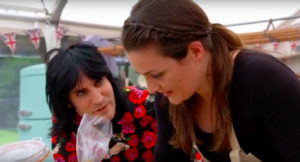Use the Bake Off rule to improve your scripts
19 Tuesday Aug 2014
 Bake Off is back.
Bake Off is back.
But is there something we can learn from the series’ success? Aside from how to bake a better cup-cake. What is it that makes Bake Off so successful? It’s clearly not complexity of plot.
The plot is one of the simplest in the world – the plot of most horror movies: take a group of people to a far-off place and get rid of them one at a time!
So is it the characters?
Simple stories, complex characters
One of my rules for writing is – simple stories, complex characters. Many scripts I see do the opposite. They try to make themselves look good through creating complicated plots. But most – perhaps all – the great screenplays for cinema or TV do the reverse.
What is it that Bake Off audiences talk about, what is it that gets headlines in the tabloids? Bake Off’s characters. From Paul Hollywood to Ruby Tandoh. (Who is still getting press as I write, even though she didn’t win).
Complex plots give you little time to develop interesting, layered characters. They tend to be (sorry) half-baked.
Simple plots allow for complex, conflicted characters – and these are the ones audiences love. Whatever the genre. Whether we’re talking about Citizen Kane, The Shawshank Redemption, Psycho, Rashomon, Les Quatre Cent Coups, Being John Malkovich, Her, Blue is the Warmest Colour, 8 1/2… the plotlines are essentially straightforward. It’s the characters that add to the richness and send the stories in different, unusual, surprising directions.
What about complex stories?
What about such films as Pulp Fiction? I hear you ask. Or indeed, 21 Grams, The Usual Suspects or Paul Haggis’s Crash? Well, if you examine the first three of those, they are essentially very simple stories, chopped into a different order. But that re-ordering doesn’t interfere with character development.
Crash is the exception that proves the rule. Here we have an interweaving of 8 different storylines and 13 major characters (count them). But each storyline is kept very simple, little more than a set-up, two turning points and a resolution (at most). And while the characters couldn’t be said to be enormously complex, by ensuring that each appears in more than one story, Haggis ensures that they have the time to have inner conflicts.
Indeed, in most cases, such as Officer Ryan, they can be the hero of one plot and the villain in another.
In long-running TV series, such as The Good Wife or Breaking Bad you do have room for greater plot complexity – but even here the building blocks are usually pretty straightforward and could be expressed in a few sentences. Again, it’s the characters that add flavour to the mix.
Keep your Bake Off cup-cakes simple
Use the Bake Off rule to improve your scripts. Look again at your favourite films and TV programmes. Then compare your own current stories.
Are you adding in extra plot complexity because it looks clever? Or you think it will keep the audience guessing? Or maybe, if you’re brutally honest with yourself, you’re afraid the audience will get bored if you don’t keep hitting them with incident after incident, twist after twist.
Be brave. Simplify your stories and add the complications into the characters. Make them the driving force behind what happens. Create subtle and unusual characters that make a writer look really clever. And engaging, surprising, conflicted characters that will really keep your audience guessing.


4 Comments
November 23, 2019 at 12:19 pm
Love this, Charles!
November 23, 2019 at 12:24 pm
Thank you very much, Clare. From you, I appreciate that.
April 22, 2021 at 8:14 am
Really interesting Charles. If you add to this (dare I say the icing on the cake) great actors capable of portraying complex characters then you have something fantastic!
April 22, 2021 at 7:13 pm
Thank you, Maureen. Absolutely agree. You can’t beat the combination of a great actor, a great screenplay and a great director to give both actor and writer the freedom to go further than perhaps even they think they can go.